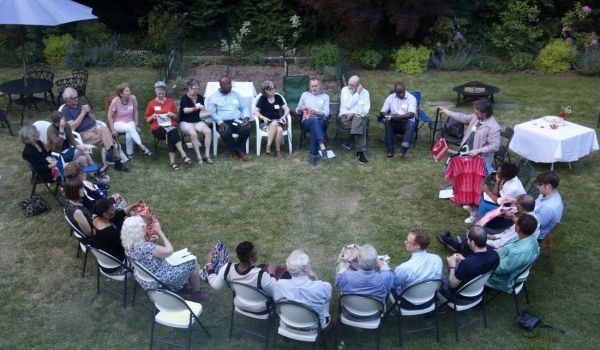McKeever “Mac” Conwell vividly remembers when he learned the importance of networking — and that moment has led him down a road that recently had him working with two companies founded by formerly incarcerated people.
Back in 2011, Conwell, a software engineer, was confident about his new product, an online platform for crowdfunded gift-giving, but he and his business partner needed more capital. At a startup event in Washington, D.C., Conwell heard an audience member ask a panel of venture capitalists: What can I do right now to convince you to write me a check? One panelist, Conwell recalls, admitted that showing up to that event wasn’t going to cut it. Instead, the venture capitalist said, he’d be most enticed if someone in the questioner’s trusted network introduced them.
“From that moment, I said, OK, now I need to figure out how do I find people that know investors,” says Conwell.
He went back to Baltimore, and kept on attending startup and entrepreneurship events around town. He set out to follow up and have lunch with every person who gave him a business card. “I didn’t always know why. I didn’t always know who they were,” he says. “I wasn’t thinking too much around it, it was just something I did.”
Pretty soon, the daunting world of raising startup capital became something more like a small town for Conwell. As he continued attending events, people he had met earlier and lunched with would see him, and introduce him to other people they knew around the room. “I started building up my network really quickly without even realizing that’s what I was doing,” says Conwell.
That network got him the capital for his first venture, and more for a second venture. Nowadays, Conwell is the one on stage giving presentations as an investor himself, in his capacity as the deal team coordinator at TEDCO, a Maryland state-affiliated startup assistance and seed investor organization that recently launched a new Minority Business Pre-Seed Fund.
The new fund is designed to address the needs of minority entrepreneurs in Maryland, who often lack access to the earliest stage of startup capital often called the “friends and family” round.
When you consider white median household wealth is $141,900, while black median household wealth is $11,000 and Latino median household wealth is $13,700, it’s not hard to imagine why there is such a lack of “friends and family” capital for most entrepreneurs of color. And yet, there is evidence that entrepreneurship can reduce racial wealth disparities. So entrepreneurs of color get stuck in a bind — starting and growing minority-owned businesses can reduce the wealth gap, but they face barriers to business startup and growth because of racial wealth gaps.
Over the course of four quarterly rounds over the next year, the new Minority Business Pre-Seed fund will award up to 10 African-American entrepreneurs with an investment up to $40,000 each to test business assumptions and build prototypes for initial market testing. Half the capital will come from TEDCO, and the other half from the Harbor Bank Community Development Corporation.
Conwell says he brought in Harbor Bank CDC on account of his philosophy around startups networking and building key relationships. “Companies that get awarded out of the fund get a business account at the bank, and as you move forward if you eventually need a small business loan, you already have a relationship with the bank,” he explains. “So for me, it made sense.”
The investments will come in the form of what’s called a “convertible note.” While technically a five-year loan with 8 percent annual interest, the convertible note doesn’t require making any payments during those five years. That gives time and space for a business to get through early phases. It’s a hybrid structure, between conventional debt and equity, ideal for getting a business to the point where it can raise equity capital from a bigger investor.
“Some investors will use us as a benchmark. They say OK, TEDCO sees you, invests in you, now we’ll engage with you,” Conwell explains. “We take pride in that.”
At the point where the startup raises at least $500,000 in equity capital from other investors, the note converts into an equity share of the business worth the initial amount plus any interest accrued to that point. For as long as the startup may need it, sometimes even before TEDCO invests, they’ll provide mentoring and support to help founders understand how a venture capitalist or angel investor thinks. It’s different from a credit union or bank or loan fund, Conwell explains.
“At the end of the day, an investor is going to look at you like ‘hey, you’re going to pitch to me a black box, I might understand a few pieces of this black box, and I want to know that if I put a dollar in, five dollars are going to come out, and if you can prove that to me, here’s my money,’” he says.
If the startup doesn’t raise equity capital within five years, but is still in operation, TEDCO and Harbor Bank will work out some type of refinancing arrangement. If the business shuts down within five years, the investment is lost, but there is no hit to the founders’ personal credit or any debt looming afterward.
It might sound risky, but TEDCO and Harbor Bank CDC are just two of many early-stage investors that use convertible notes. Since inception, using primarily convertible notes, TEDCO has invested more than $110 million in Maryland-based tech startups that have gone on to attract more than $550 million in follow-on investment. According to TEDCO, the 250-plus companies in its current portfolio generate more than $1 billion dollars a year in economic activity in the state of Maryland, including 4,300-plus jobs at an average wage of $74,700. Harbor Bank CDC has also been making use of convertible notes to invest in companies that might be too early in their lifecycle to access a bank loan.
In terms of the kinds of ideas he’s hoping to find for Minority Business Pre-Seed Fund investment, “I want to see people coming at solving problems from an angle that you don’t commonly see,” says Conwell. As examples, he mentions two startups, both founded by people of color who were recently incarcerated.
GunBail is a service that allows jailed defendants to be released on bail in exchange for turning in an illegal gun. For a $100 processing fee, GunBail sends a properly addressed box to the defendant’s family, allowing them to turn in an illegal gun to their municipal gun drop-off or buyback program on behalf of their jailed family member. The company makes the arrangements with local law enforcement and court systems to facilitate the process.
There’s also Pigeonly, which allows friends and family members to upload photos into a smartphone app, which can then deliver those photos (for a small fee per photo) to incarcerated family members via direct mail.
In both of those cases, Conwell points out, the entrepreneurs’ time behind bars inspired their ideas.
TEDCO also provides mentoring, technical assistance and connections to its networks for all its portfolio companies, often before they’ve even invested. As deal team coordinator, Conwell is the first person to see all the applications when they come through. When he came on board in November, he dramatically reduced the first phase of the application, from a 25-page business plan to a two-page executive summary.
“Some people get to apply and maybe they’re not yet ready for funding, or maybe we have to work on their pitch deck, but we get to see them, we get to give them advice, we get to help them a little bit along the way, see them grow and do better,” he says.
And if they ever want to accompany Conwell to a startup or entrepreneurship event around town, they can just ask. He maintains an email listserv, and sends weekly messages with rundowns of upcoming events, indicating which ones he’s planning on attending that week. He’s been doing it for years.
“Something I do for my friends and people who I meet along the way who just want to learn,” Conwell says.
The Equity Factor is made possible with the support of the Surdna Foundation.

Oscar is Next City's senior economic justice correspondent. He previously served as Next City’s editor from 2018-2019, and was a Next City Equitable Cities Fellow from 2015-2016. Since 2011, Oscar has covered community development finance, community banking, impact investing, economic development, housing and more for media outlets such as Shelterforce, B Magazine, Impact Alpha and Fast Company.
Follow Oscar .(JavaScript must be enabled to view this email address)










